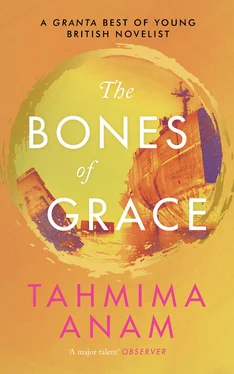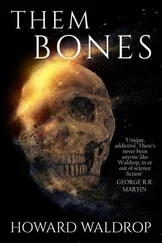I hailed a rickshaw, too impatient now to wait for Abboo, and pointed in the direction of Nanu’s house in Dhanmondi. As we crossed Mirpur Road I took out my phone and sent a text message to my parents. I have to know the truth , it said. Otherwise I am leaving home and never coming back . I couldn’t help sounding hysterical, suddenly all the years I had not known clambering on top of me. I peeled back the rickshaw’s sunshade, trapped in my own chest, unable to fill my lungs with enough air.
The front door was ajar and there were voices coming from inside. I entered and saw a man seated on the sofa with his back to me, a massive back, broad and padded, a white turban on his head. He turned to face me and then quickly turned away.
‘It’s only Zubaida,’ my grandmother said.
The man stood up and came towards me. Under the turban, the pair of thick-rimmed glasses, the beard that brushed his chest below, he had a beautiful face, dark, soft eyes and a kind mouth. ‘As-salaam alaikum,’ he announced. On his forehead was a black bruise like Ali’s, only wider and darker, shiny from years of prayer. ‘How wonderful it is to cast my eyes on you.’
‘Your uncle is visiting from America. He just arrived this morning.’ Nanu was smiling in that wistful way she did whenever she mentioned my uncle. I myself had no memory of this man. He had come to Dhaka only once, as far as I could remember. He had given me a Kit Kat and frightened me with a story about the heat of hellfire. My parents often talked about him. Before the war, Ammoo told me, Sohail was a charismatic young man who kept a copy of Mao’s Little Red Book in his front pocket. Their father had died many years before, and in their modest bungalow in Dhanmondi it was just him and Ammoo and Nanu, and something about being surrounded by women had made him delicate, almost fragile. Certainly not a fighter. So it came as a surprise to everyone when he crossed the border and joined the Mukti Bahini. Sohail, Ammoo says, did not distinguish himself as an assembler of crude explosives, or as a crack shot or a fearless running-into-the-line-of-fire type. He is rumoured to have baulked at crucial moments, like the igniting of a device or the running over of an army checkpoint. But what he lacked in skill, and courage, he made up for in conviction. When it came to believing what he was doing was right, Sohail was unbeatable.
But Ammoo doesn’t recall what he did in the war as much as what he became after the war was over. It was not fashionable then, as it is now, for young people to make the pilgrimage to Mecca, or to encourage their wives to cover their heads, or to pepper their sentences with appeals to God. But Sohail Mama adopted the cloak of religion just after the war and did not shed it for the decades that followed, not through the death of his son, or the shifting of the world order, or the isolation from his friends and his past that were demanded by this new, lean life. In his own way he was a man who pushed against the tide, breaking hearts along the way, mowing over his friendships and his family because he was convinced he was doing the right thing, no matter how high the price — the highest price being that he and Ammoo rarely spoke, and whenever Ammoo mentioned his name or told me anything about him, she would always end with a sigh and say that it was as if her brother, like Abboo’s, had died in the war.
I sat down beside Sohail now and he offered me a plate of dates, which he said someone had brought to him from Mecca. The dates were stuffed with whole almonds. I put one in my mouth and when I bit down I tasted a cloying sweetness. We said very little, regarding one another openly. I consumed one date after another. Sohail occasionally peered over his glasses and exhaled deeply, pulling and smoothing his beard with one hand, then another.
I wondered about his sons, whether, if I happened upon them, I would find them at all familiar, or if they would be just like all the other bearded men at airports and shopping malls, their wives trailing a few feet behind them. ‘Nanu,’ I said, turning to my grandmother. ‘Rashid said you were getting your diabetes checked.’
‘Sweet boy,’ she said, smiling. ‘He sent me his car so I could go to the doctor.’
Bastard. ‘What did the doctor say?’
She waved her hand. ‘Nothing to worry about. I’m not going to stop eating my Toblerone.’
‘I came to ask you something.’
Somehow Sohail’s being there made me believe that it would all finally come out. In fact, I was unsure whether anyone would be capable of lying in his presence, and I wondered whether this was the secret to his success, the reason he was able to convert many dozens of Americans every week, not only at his mosque, but also as he went about his life, shopping at the supermarket, refilling at the gas station, picking up his wife from her Islamic exercise class on the other side of town.
I turned to Nanu. ‘Did you know I was adopted?’
Her reply was immediate. ‘Yes.’
‘From where?’
‘I always thought your parents should have told you, but they had their reasons. They asked me not to talk about it.’
‘Did you know?’ I asked Sohail.
‘Your mother wrote to me. But she told me it was in confidence, and I haven’t spoken of it since.’
The doorbell rang. ‘Don’t answer that,’ I said. ‘Tell me more.’
‘I don’t know any more, jaan,’ my grandmother said. ‘Come, sit beside me.’ She patted the cushion, upholstered in pink.
I wasn’t sure how or where to direct myself. The doorbell rang a second time, and I found myself leaning against the door. ‘Are any of your children adopted?’ I asked Sohail.
‘Mine are not. But our Prophet, peace be upon him, was himself an orphan.’
I nodded, remembering what I had whispered to you that night at Sanders. The bell rang for the third time. Then, my father’s voice. ‘Sweetheart, open the door.’
‘Is Ammoo there?’ I asked.
A pause. ‘Yes.’
‘Let them in,’ Nanu said gently.
I opened the door and found my parents in the corridor, standing slightly apart but holding hands. ‘Sohail Mama is here,’ I said.
I stepped aside and they followed me in. Nanu rose from her seat, leaning on her walker. ‘I’m going to get more tea,’ she said. ‘Sohail, come with me.’
‘I can’t, the servant girl is in there,’ he said. He observed purdah and the only women he would glance at had to be related to him by blood.
‘For God’s sake,’ Ammoo said, ‘you haven’t changed.’
Sohail turned to Ammoo and hugged her, unoffended.
She shrugged him off. ‘I’m here for my daughter.’
‘Something of a daughter,’ I said.
Nanu closed the kitchen door behind her. Sohail, enormous, made himself invisible by looking up at the ceiling and mouthing something — a prayer, I assumed. Ammoo began to make galloping, strangled sounds into her hands. The noise echoed around the room and then was swallowed by Abboo and me. We looked at each other and I nodded to him so he would know it was okay for him to start explaining. He leaned forward, his elbows on his knees. ‘You know, don’t you, sweetheart, that I was captured during the war.’
So he was going to start with that. I couldn’t be angry about that, could I, because he was a war hero with war wounds. Maybe that is how I should have been thinking of myself all along, as a war wound, a throbbing reminder of something bad and something good that happened all at once.
‘After I was released, and the war ended, and your mother and I married — well, we tried for a few years, but as it turns out—’
I was afraid he would detail his torture so I finished his sentence. ‘You couldn’t have children.’
Читать дальше












